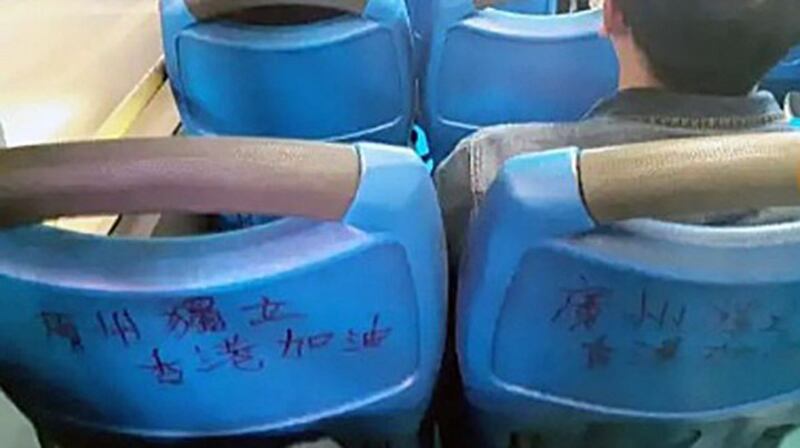Authorities in the southern Chinese province of Guangdong have banned a Model United Nations group after it re-enacted a historical debate about a federal system for China's provinces and regions, ringing alarm bells in Beijing over a possible resurgence of Cantonese separatism.
Nanhai district officials in Guangdong's Foshan city banned the "Lingnan Model United Nations" for failing to correctly register as a civil organization, after receiving a tip-off from a member of the public in on Aug. 18, according to a notice on the official website of the Nanhai district government that has since been deleted.
A copy of the Oct. 19 notice reposted to the overseas-based Chinese Digital Times website said the group was suspected of carrying out "illegal activities" and training people to debate "sensitive topics."
Every year, hundreds of thousands of students and others around the world participate in Model U.N. groups and gatherings where attendees simulate the activities and functions of the United Nations or engage in political or historical debates.
A former Model U.N. participant from Guangdong who gave only the surname Lin for fear of reprisals said the group had held a re-enactment of a historical debate in the National Congress during the 1911 Republic of China era, in which delegates discussed the possibility of a federal system for China and the notion of "provincial powers."
"They chose this topic to simulate the debate on provincial autonomy during the Republic of China era," Lin said of the government that ruled China from the fall of the Qing dynasty in 1911 to the 1949 communist victory in the civil war. "It touches on the history of the federal provincial autonomy movement."
Distinct language and culture
Provincial autonomy is a particularly sensitive topic in Guangdong, which has a strong regional identity with a distinct Cantonese language and culture.
It has has been targeted for suppression since the Qing dynasty, from a 1922 massacre by Kuomintang troops in Guangzhou that ended a pro-independence rebellion by Hong Kong-connected Cantonese warlord and liberal intellectual Chen Jiongming, to later moves by Beijing to suppress the use of Cantonese in public life.
More recently, there has been a resurgence of slogans calling for independence for the province in Guangzhou, as well as a number of pro-Cantonese demonstrations in 2010 sparked by plans to axe Cantonese-language broadcasting.
During the 2019 protest movement in Hong Kong, where most people speak Cantonese as well as Mandarin, only a minority of protesters and politicians called for independence from Chinese rule. But the ruling Communist Party insists that the movement was a " separatist" one, involving "collusion with foreign forces."
"Frankly speaking, I think this was quite a bold choice of topic," Lin said.

"I understand why the authorities thought it was sensitive, because it has to do with the ... federalist movement, which [the authorities] fear could spark a wave of regional independence movements and end up breaking up the country," he said.
"What's more, Guangdong formerly played a huge part in the movement for provincial autonomy," he said. "I'm sure the government doesn't want to see any organized attempt to debate the matter."
The Foshan municipal civil affairs bureau also issued a warning to the general public to ensure that any group they join or set up is registered via a centralized government portal.
"We must consciously boycott illegal social organizations!" it said.
Sensitive question
The Lingnan Model United Nations was set up in July 2021. Publicly available information showed that it had planned to hold a simulation of a debate titled "Provincial autonomy and provincial constitutions" that was held by the constitutional drafting committee of the Kuomintang's Republic of China government in January 1923.
The historical debate came at a time when "the federalist movement for provincial autonomy was in full swing, and calls for provincial autonomy to be written into the constitution were growing stronger," according to the event publicity material.
Under such circumstances, "Could China adopt a federal system?" the debate topic asked.
Guangdong wasn't the only Chinese province to have a burgeoning independence or autonomy movement in the early 1920s. Emerging communist leader Mao Zedong put his name to an autonomy movement in his home province of Hunan, while Zhejiang, Sichuan and other regions of the country saw similar campaigns.
Eventually, the constitution that was published in October 1923 insisted on the authority of the central government, but allowed for some degree of local control by provincial governments.
Lin, who said he also favors a federal approach for China, said it was an infringement of academic freedom to ban such debate.
"If I were a young person, I would have wanted to take part in that event, but now it's been banned," he said.
Repeated calls to the Foshan Civil Affairs Bureau rang unanswered during office hours on Monday. An email with questions directed to the organization's published email address had gone unanswered by the time of writing.
A Guangdong resident who has also taken part in Model United Nations debates and who asked for anonymity for fear of reprisals agreed, saying the banning of the event showed that there is currently a lot of political pressure on public speech.
"Why are [such] issues so sensitive?" the person said. "The Foshan Civil Affairs Bureau hasn't made it clear."
"I think they actually don't want people to understand history and are afraid that people will start to pay attention to sensitive issues like this from modern history," they said. "But such a high-pressure approach will only make everyone more interested in sensitive topics."
Translated by Luisetta Mudie. Edited by Malcolm Foster.
